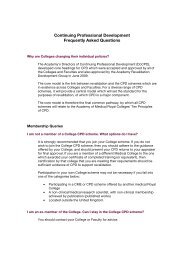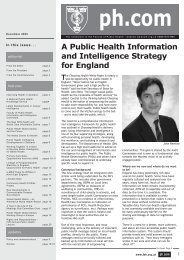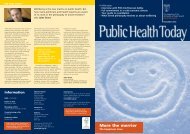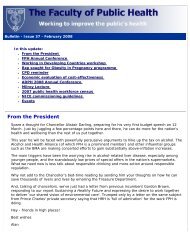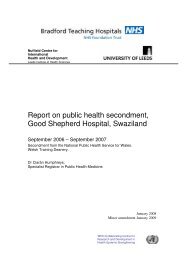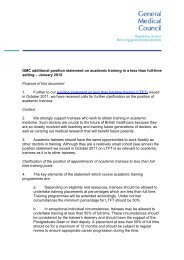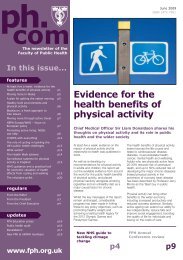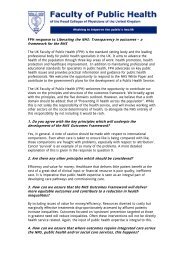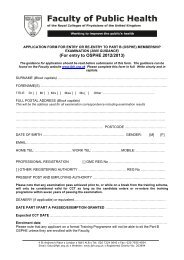- Page 1 and 2:
A Chronology of State Medicine, Pub
- Page 3 and 4:
Published by Faculty of Public Heal
- Page 5 and 6:
ACKNOWLEDGEMENTS ii I am indebted t
- Page 7 and 8: PREFACE iv "Those who cannot rememb
- Page 9 and 10: 2 INTRODUCTION The chronology start
- Page 11 and 12: The Norman conquest of England in 1
- Page 13 and 14: 1279 - 1309 1279 Statute of Mortmai
- Page 15 and 16: 1315 - 1358 1315 The Statute of She
- Page 17 and 18: 1360 - 1389 1360 An act set out "Th
- Page 19 and 20: 1462 - 1499 1462 First Royal Charte
- Page 21 and 22: 1530 - 1536 1530-40 Suppression of
- Page 23 and 24: Branding and slavery imposed as the
- Page 25: 1559 Cont - 1584 1559 cont Under th
- Page 28 and 29: 1601 - 1628 1601 Poor Law Act (43 E
- Page 30 and 31: 1658 Thomas Browne wrote in favour
- Page 32 and 33: 1672 The Scottish Parliament requir
- Page 34 and 35: 1694 - 1698 1694 Bank of England se
- Page 36 and 37: 1721 - 1739 1721 Robert Walpole bec
- Page 38 and 39: 1740 London Hospital (later Royal)
- Page 40 and 41: 1763 "Genera Morborum in Auditorum
- Page 42 and 43: Guy's Hospital Physical Society fou
- Page 44 and 45: Vienna) published; the last volume
- Page 46 and 47: 1788 Cont - 1792 1788 cont complain
- Page 48 and 49: Liverpool Medical Institution found
- Page 50 and 51: First General Enclosure Act (41 Geo
- Page 52 and 53: were passed by the Commons in 1816,
- Page 54 and 55: 1828 Cont - 1831 1828 cont certain
- Page 56 and 57: 1831 Cont - 1832 1831 cont series o
- Page 60 and 61: London University established by ch
- Page 62 and 63: 1840 Cont - 1842 1840 cont Report o
- Page 64 and 65: Reports of the Select Committee on
- Page 66 and 67: 1856 Poor Law Administration Act (1
- Page 68 and 69: libraries and stated that access to
- Page 70 and 71: 1854 Corrupt Practices Prevention A
- Page 72 and 73: National Association for the Promot
- Page 74 and 75: 1862 and 1891. The first "cottage h
- Page 76 and 77: 1861 Cont - 1862 1861 cont A Select
- Page 78 and 79: presented to it of abuse and depriv
- Page 80 and 81: Metropolitan Poor Act to the rest o
- Page 82 and 83: to qualify for municipal franchise
- Page 84 and 85: 1870 Cont - 1871 1870 cont Parliame
- Page 86 and 87: 1871 Cont - 1872 1871 cont distingu
- Page 88 and 89: Vaccination Act (37&38 Vict., c.75)
- Page 90 and 91: legislation. 1875 Cont - 1878 1875
- Page 92 and 93: Mental After-Care Association found
- Page 94 and 95: 1885 Redistribution of Seats Act (4
- Page 96 and 97: an inlet from the river Mersey. 188
- Page 98 and 99: Buckinghamshire. Florence Nightinga
- Page 100 and 101: 1895 Factory and Workshop Act (58&5
- Page 102 and 103: 1897 Cont - 1898 1897 cont societie
- Page 104 and 105: First International Conference for
- Page 106 and 107: 1903 Cont - 1904 1903 cont Institut
- Page 108 and 109:
1906 Cont - 1908 1906 cont "Public
- Page 110 and 111:
1908 Cont - 1909 1908 cont person";
- Page 112 and 113:
1909 Cont 1909 cont be raised to 15
- Page 114 and 115:
1912 - 1914 1912 Coal (Minimum Wage
- Page 116 and 117:
1914 Cont - 1915 1914 cont which de
- Page 118 and 119:
1915 Cont - 1917 1915 cont Health o
- Page 120 and 121:
Industrial Fatigue Research Board (
- Page 122 and 123:
1920 - 1921 1920 Census Act (10&11
- Page 124 and 125:
First woman barrister called to the
- Page 126 and 127:
The Voluntary Hospitals Committee o
- Page 128 and 129:
1926 Cont - 1927 1926 cont economis
- Page 130 and 131:
Age of Marriage Act (19&20 Geo.V, c
- Page 132 and 133:
1930 - 1931 1930 Poor Law Act (20&2
- Page 134 and 135:
1933 Local Government Act (23&24 Ge
- Page 136 and 137:
1934 Cont - 1936 1934 cont The Repo
- Page 138 and 139:
1936 Cont - 1937 1936 cont practiti
- Page 140 and 141:
1944. Blind Persons Act (1&2 Geo.VI
- Page 142 and 143:
1939 Cont 1939 cont Emergency Hospi
- Page 144 and 145:
1941 Cont - 1942 1941 cont NMcA Gre
- Page 146 and 147:
1942 Cont - 1943 1942 cont work fro
- Page 148 and 149:
authorities to provide special educ
- Page 150 and 151:
25 per cent of public school places
- Page 152 and 153:
1946 Cont 1 1946 cont of executive
- Page 154 and 155:
1946 Cont 2 - 1947 1946 cont Commit
- Page 156 and 157:
1947 Cont - 1948 1947 cont district
- Page 159 and 160:
1949 1949 Representation of the Peo
- Page 161 and 162:
1949 Cont 1949 cont "Sickness in th
- Page 163 and 164:
supervising authorities; placed a d
- Page 165 and 166:
1951 Cont 2 - 1952 1951 cont econom
- Page 167 and 168:
1952 Cont - 1953 1952 cont hospital
- Page 169 and 170:
Cmd.9333, (chairman, Sir Thomas Phi
- Page 171 and 172:
The Committee of Inquiry on The Reh
- Page 173 and 174:
A survey of family expenditure was
- Page 175 and 176:
elating to mental disorder; set out
- Page 177 and 178:
The National Service Act 1948 requi
- Page 179 and 180:
1961 Cont - 1962 1961 cont The Join
- Page 181 and 182:
Courses for clinical nurse teachers
- Page 183 and 184:
health and welfare services. The do
- Page 185 and 186:
establish nursing degrees. The Comm
- Page 187 and 188:
prevent abuse. The review followed
- Page 189 and 190:
The Scottish White Paper, "Social W
- Page 191 and 192:
an American academic, described and
- Page 193 and 194:
set up. See 1970.
- Page 195 and 196:
other doctors undertaking this work
- Page 197 and 198:
1967 Cont 3 - 1968 1967 cont The Sh
- Page 199 and 200:
available to all. ... The new depar
- Page 201 and 202:
1968 Cont 3 - 1969 1968 cont compla
- Page 203 and 204:
Tenth Report of the Review Body on
- Page 205 and 206:
1970 1970 Office of Population Cens
- Page 207 and 208:
The Council for the Education and T
- Page 209 and 210:
1971 Cont 1 1971 cont and some aspe
- Page 211 and 212:
1971 Cont 2 1971 cont populations.
- Page 213 and 214:
1972 Cont 1 1972 cont Poisons Act (
- Page 215 and 216:
1972 Cont 2 1972 cont practitioner;
- Page 217 and 218:
1972 Cont 3 1972 cont chairs in reh
- Page 219 and 220:
Agency and the Training Services Ag
- Page 221 and 222:
a holiday in Benidorm. See 1978. A
- Page 223 and 224:
ange of research in the community a
- Page 225 and 226:
contract" whereby the trade unions
- Page 227 and 228:
The Government published a policy d
- Page 229 and 230:
1975 Cont 2 - 1976 1975 cont "Medic
- Page 231 and 232:
1976 Cont 1 1976 cont promoting hea
- Page 233 and 234:
1976 Cont 2 1976 cont admission and
- Page 235 and 236:
time scales for night duty and thea
- Page 237 and 238:
espect of premises used by disabled
- Page 239 and 240:
1978 Cont 2 - 1979 1978 cont The De
- Page 241 and 242:
Faculty of Community Medicine. A he
- Page 243 and 244:
e placed on the centralisaton of se
- Page 245 and 246:
1980 Cont 2 - 1981 1980 cont preven
- Page 247 and 248:
1986. A Joint Working Group on the
- Page 249 and 250:
1982 Cont - 1983 1982 cont The Heal
- Page 251 and 252:
1983 Cont - 1984 1983 cont measures
- Page 253 and 254:
Baroness Warnock), Cmnd.9314, recom
- Page 255 and 256:
1985 Cont 1 1985 cont Charities Act
- Page 257 and 258:
Animals (Scientific Procedures) Act
- Page 259 and 260:
the Nuffield Foundation, recommende
- Page 261 and 262:
1987 Cont 1 1987 cont Registered Es
- Page 263 and 264:
School Boards (Scotland) Act (c.47)
- Page 265 and 266:
War, Volume I, The NHS before 1857"
- Page 267 and 268:
Computer Misuse Act (c.18) provided
- Page 269 and 270:
1991 Cont - 1992 1991 cont framewor
- Page 271 and 272:
1992 Cont 2 - 1993 1992 cont King E
- Page 273 and 274:
1993 Cont 1 1993 cont The Royal Com
- Page 275 and 276:
(chairman, A Wilson) recommended re
- Page 277 and 278:
1995 Cont - 1996 1995 cont Criminal
- Page 279 and 280:
for general medical services, hospi
- Page 281 and 282:
Advisory Service (see 1976) to a co
- Page 283 and 284:
1997 Cont 2 - 1988 1997 cont compet
- Page 285 and 286:
The Department of Health published
- Page 287 and 288:
social security and set out the Gov
- Page 289 and 290:
surrogate mothers should be recompe
- Page 291 and 292:
Standards Agency as an independent
- Page 293 and 294:
1999 Cont 2 1999 cont problems: rat
- Page 295 and 296:
1999 Cont 3 1999 cont group; accide
- Page 297 and 298:
health and well-being in the UK, fo
- Page 299 and 300:
Crude death rate is the number of d
- Page 301 and 302:
APPENDIX 2 FIRST LORDS OF THE TREAS
- Page 304 and 305:
APPENDIX 3 (cont) CHIEF MEDICAL OFF
- Page 306 and 307:
A SHORT BIBLIOGRAPHY Abel-Smith, B.
- Page 308 and 309:
SHORT BIBLIOGRAPHY (Cont) Rivett, G
- Page 310 and 311:
Children's 1908, 1948, 1958, 1972,
- Page 312 and 313:
Duties on Births, Deaths and Marria
- Page 314 and 315:
INDEX TO ACTS 6 Hearing Aid Council
- Page 316 and 317:
London Metropolis Fire Brigade 1865
- Page 318 and 319:
Nurses (Scotland) 1949, 1951 Nursin
- Page 320 and 321:
INDEX TO ACTS 12 Regulation of Pari
- Page 322 and 323:
Unemployed Workmen 1905 Unemploymen
- Page 324 and 325:
Community Care in the Next Decade a
- Page 326 and 327:
Health Education 1964 Health of the
- Page 328 and 329:
INDEX OF OFFICIAL REPORTS 6 Materni
- Page 330 and 331:
INDEX OF OFFICIAL REPORTS 8 Physica
- Page 332 and 333:
Services for the Mentally Handicapp
- Page 334 and 335:
Accidents (see also factories, mine
- Page 336 and 337:
Audit Commission 1982, 1986, 1990,
- Page 338 and 339:
Bribery - See Corruption Bridewell
- Page 340 and 341:
Census 1563, 1603, 1678, 1753, 1800
- Page 342 and 343:
Cohen, R.H.L. 1962, 1972 Colindale
- Page 344 and 345:
Cross, Sir Richard 1875, 1888 Cross
- Page 346 and 347:
Drugs (see also Food and Drugs) 178
- Page 348 and 349:
"Essay Towards the Improvement of P
- Page 350 and 351:
GENERAL INDEX 17 "Future Provision
- Page 352 and 353:
GENERAL INDEX 18 Gibraltar sickness
- Page 354 and 355:
GENERAL INDEX 20 Health and Safety
- Page 356 and 357:
Hospital Administrative Staff Colle
- Page 358 and 359:
Insulin 1922, 1956 GENERAL INDEX 24
- Page 360 and 361:
Labour exchanges 1909 Labourers, St
- Page 362 and 363:
"The London Pharmacopoeia" 1618 Lon
- Page 364 and 365:
GENERAL INDEX 29 Mallaby, Sir Georg
- Page 366 and 367:
GENERAL INDEX 31 Mental handicap (i
- Page 368 and 369:
GENERAL INDEX 33 National Bureau fo
- Page 370 and 371:
Nottingham University 1948 GENERAL
- Page 372 and 373:
Pasteur, L. 1856, 1864, 1879, 1880,
- Page 374 and 375:
GENERAL INDEX 38 "Physical Training
- Page 376 and 377:
GENERAL INDEX 40 Professions Supple
- Page 378 and 379:
GENERAL INDEX 42 Rehabilitation 193
- Page 380 and 381:
GENERAL INDEX 44 Sadler, Sir Michae
- Page 382 and 383:
GENERAL INDEX 46 Sex discrimination
- Page 384 and 385:
Stewart, S. 1998 GENERAL INDEX 48 S
- Page 386 and 387:
GENERAL INDEX 50 Trades Boards 1909
- Page 388 and 389:
GENERAL INDEX 52 Wall Street, New Y
- Page 390:
Young, H. 1926 Young, Michael (Lord



